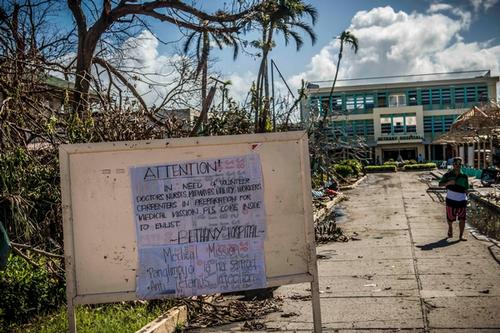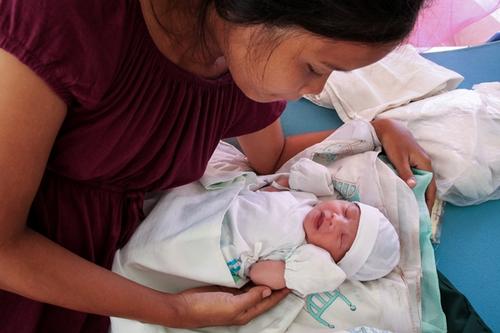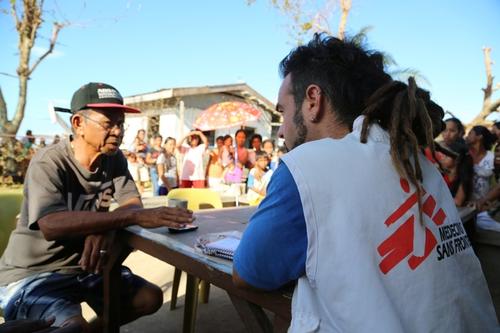As the acute emergency phase following Typhoon Haiyan subsides, the next major hurdle for the people of the Philippines is how they will cope with the psychological impact of the disaster.
Ana Maria Tijerino, psychologist and mental health advisor, is working with MSF emergency teams on Panay Island. She describes the scale of the needs the mental health teams are discovering , and how MSF plans to respond to the situation.
It is just the third day of our medical activities here in Panay but we are already seeing so many people suffering from psychological distress. It is especially acute in the villages where people did not have the time to evacuate, and actually had to live through the storm, and see the destruction in front of their eyes. After living through such a severe experience, it is almost impossible to come out mentally unscathed.
People will often come to our doctors and nurses complaining of headaches, back pain or shortness of breath. These symptoms are often related to the stress they have experienced. We are aiming to ‘normalise’ these symptoms for the patients we see, and help them understand that what they are experiencing is simply a normal reaction to an extremely abnormal event.
I saw one woman today who had been unable to leave her bed for the last week because she was feeling so upset. She was having a lot of headaches and other body pains. She had heard that a medical team was coming to her village, so today she made the effort to get out of bed. As soon as the doctor saw her, we realised that a lot of the physical complaints were more related to the stress she experienced as a direct result of the typhoon. She and her husband had taken shelter under a bed during the typhoon, and their house was completely destroyed. Explaining what she had lived through, made her cry through the whole consultation.
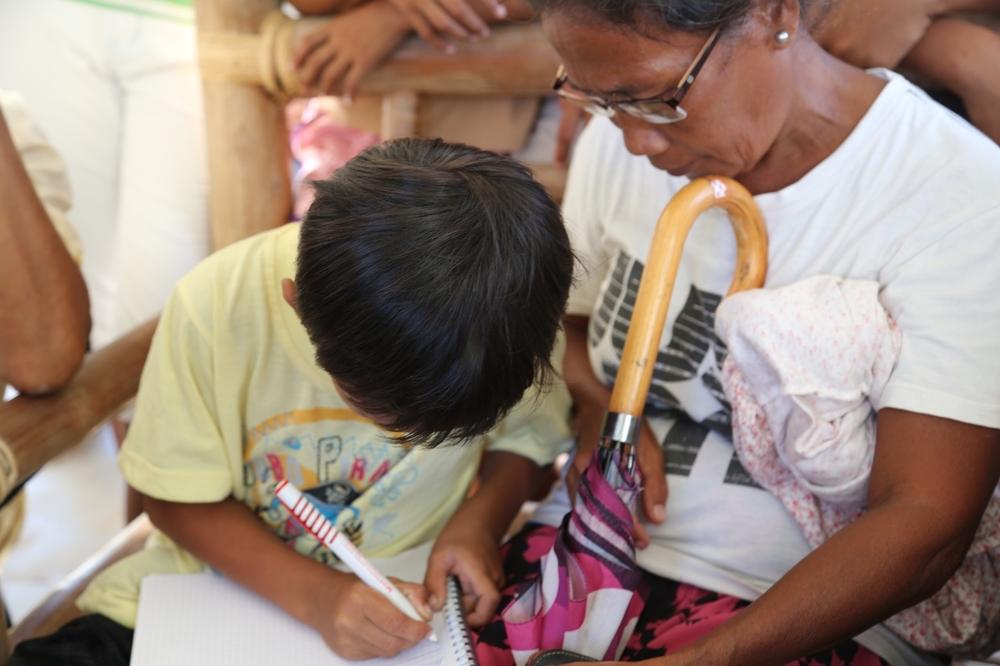
Elderly and children the most vulnerable
Most of the patients we are seeing are either elderly or young children. In general, the elderly are very vulnerable during emergencies. Usually they do not have strong support networks; they may be widowed; or they may have physical disabilities. It is more difficult for them to be evacuated, and they may not want to because they are concerned to protect their homes. At the same time, they are often left behind in terms of aid, which is frequently directed towards children and women of reproductive age. They also bear a lot of the stress: in this culture, they are the heads of the families. Even though their personal experience of the disaster may be overwhelming , they also have to look after their family.
Children have also been strongly affected. With schools completely destroyed and unlikely to open again soon, children are left without their normal daily routine which is so essential to recovery. One positive sign is that you can see some children playing in the village, and you see their resilience even amidst an ongoing crisis. In our clinics we are seeing many children with differing reactions to the typhoon. They are afraid, they cannot sleep, and many will cry when there is heavy rain.
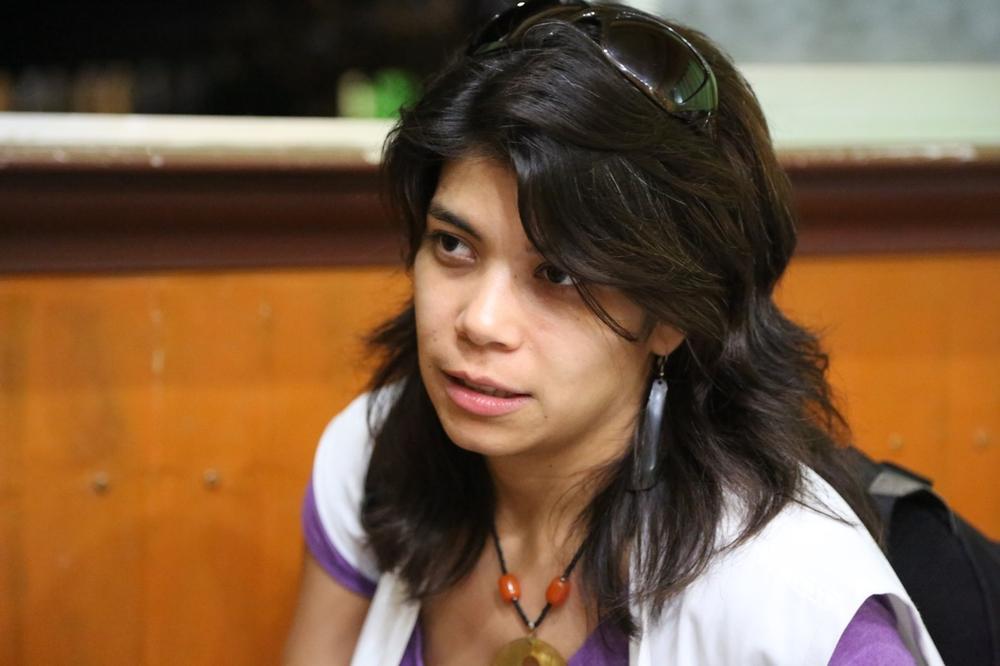
I saw a 13 year old girl today who was too scared to sleep at night. Somebody had died close to her house, and she was saying that a spirit had taken over her body and her mind. During the typhoon, she was trapped in her house with her family for nine hours, facing the wall, trying to protect each other from the wind and the rain. When you talk to her, she could describe what she felt at that moment, but the experience is so overwhelming that she also needs a supernatural explanation. We will work with her and her parents, and use drawing therapy to encourage her to explain and deal with her emotional situation.
We will have targeted activities for children such as groups where they can draw and play, and consultations together with their parents for them to talk about what they have been through.
Reaching out to isolated areas
We are working in an area of isolated villages and islands, and one of the biggest challenges will be to try to reach as many people as possible. We will provide group and individual sessions during our mobile clinics, and also provide training to community health workers and teachers. We will also seek to detect acute cases that may require extra support.
Self-support groups should be a strategy that will work well here. The adults here have been especially receptive to this, as this is already part of the way they have chosen to cope. By doing this, we essentially ‘reactivate’ what is a normal coping mechanism: encouraging them to talk amongst themselves to find solutions, to share their similar experiences. The best strategy is to help the community help themselves.
Strength in community
There is a very strong sense of community in the Philippines and this will certainly help for a better recovery. They have really mobilized to help each other, giving shelter and clothes to their neighbours when they themselves have lost everything.
The Filipinos are used to natural disasters. But this typhoon is on a scale that not many people have ever seen before. The provision of mental healthcare is therefore absolutely crucial. Arguably, depression can be as much of a disability as blindness. Anxiety disorders and panic attacks prevent people from performing their daily routine. These are the kinds of long term consequences that we are trying to prevent.
From its experience in previous natural disasters, such as the 2004 tsunami in South East Asia and the 2010 earthquake in Haiti, MSF has learned that a response to mental health needs is essential in the immediate aftermath of a crisis. To help prevent the negative long term psychological consequences of such a disaster, mental healthcare needs to be incorporated in the very early stages of medical-humanitarian response.
In the Philippines, Médecins Sans Frontières (MSF) has already deployed 194 expatriate staff, including 8 psychologists. Supported by Filipino staff, they will work to alleviate the inevitable psychological suffering that follows a disaster on such a massive scale.



